Adrian Collins's Blog, page 237
May 2, 2019
Enter the Dragons: Richard A Knaak’s fiery fiends
To me, dragons are the epitome of magic and fantasy. They are epic in both proportion and power. With fifty novels in the fantasy genre, I’ve created my share. I’ve worked on dragons in my own worlds and helped develop those in others. I’ve always attempted to make them different from one another, at least in some regard, so that each world has something unique to give to the reader. In fact, I actually think that dragons themselves offer that opportunity just for being who and what they are. Below, are a few prime examples, including my latest, the dragon from the Black City Saint series.
The Dragon Kings and the drakes of the Dragonrealm
My first creation, the Dragonrealm has been, and continues to be, an active part of my career from its inception. The simple explanation is that many of the lands in the series begin under the claws of shape-shifting ruler of a race that has two basic forms. Giant dragons and, for the males, scaly-armored knights. The females are a bit more successful, managing what appears to be more elven forms.
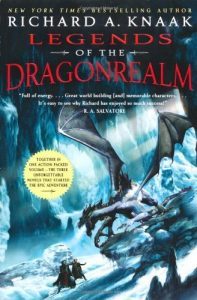 The truth is, however, that there is a reason that a human form has more and more appeal to them. The drake race of the Dragonrealm shares the same ancestor as the humans—an ancient race of sorcerers called the Vraad. Through desperate manipulation of spells, some of the Vraad attempted to escape their dying world by transporting their spirits to remotely-created human bodies strengthened by the essence of animalistic dragons discovered in what would become the Dragonrealm. That plan backfired badly, resulting in them becoming sentient dragons who, with a few exceptions, forgot their lives. Their descendants remain mostly unaware, but newer drakes sometimes seem more and more human again… which may only make them more sinister.
The truth is, however, that there is a reason that a human form has more and more appeal to them. The drake race of the Dragonrealm shares the same ancestor as the humans—an ancient race of sorcerers called the Vraad. Through desperate manipulation of spells, some of the Vraad attempted to escape their dying world by transporting their spirits to remotely-created human bodies strengthened by the essence of animalistic dragons discovered in what would become the Dragonrealm. That plan backfired badly, resulting in them becoming sentient dragons who, with a few exceptions, forgot their lives. Their descendants remain mostly unaware, but newer drakes sometimes seem more and more human again… which may only make them more sinister.
The dragon folk and the dragon who judges gods
In my more recent Rex Draconis saga, there is a very distinct and tumultuous group of gods suddenly become more interested again in the mortal world. Some have good intentions, others do not. They can be glorious and they can be petty. Yet, in Tiberos, the world of the series, there is a power even greater than them, set by an enigmatic force to try to ensure that the world stays in some sort of balance. The title refers to the legend of a powerful dragon that even the gods fear, but who is so rarely seen that even the deities wonder if he still exists. He moves in subtle ways, using agents who may or may not understand they serve him. Despite his vast power, Rex Draconis wields it judiciously, well aware of the chaos he himself might be capable of.
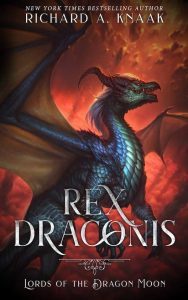 On the other end, though, are the dragon folk, consisting of the Afafni and the Fafni, two races diametrically opposed and with ambitions harmful to the mortal races. In their secretive war against one another, they seek to become the gods they believe they should be. Each wears the form of a dragon part of their life, with one group during the night and the other during the day. Much to their bitterness, though, their dragon forms are mere shadows of Rex Draconis, and that jealousy only makes them more vicious. They would yearn to be true dragons, and, thus, true gods, in their minds.
On the other end, though, are the dragon folk, consisting of the Afafni and the Fafni, two races diametrically opposed and with ambitions harmful to the mortal races. In their secretive war against one another, they seek to become the gods they believe they should be. Each wears the form of a dragon part of their life, with one group during the night and the other during the day. Much to their bitterness, though, their dragon forms are mere shadows of Rex Draconis, and that jealousy only makes them more vicious. They would yearn to be true dragons, and, thus, true gods, in their minds.
The most primeval of dragons
In the beginning…of the Black City Saint saga… there was the dragon. He had no name. He had one purpose, one… curse. Condemned to guard the gate between the mortal world and Feirie, he was forced to follow it as it ever shifted from one location to another. That is, until he was slain by a Roman tribune unaware of his true task, a tribune who would become known as St. George.
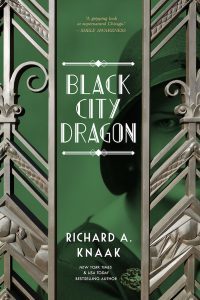 However, two things neither of them expected to happen forever changed them. One was that, with its guardian slain, St. George became the unwilling replacement. For the next sixteen centuries, he would follow the gate, trying his best at all times to prevent dark powers on either side from crossing. The second was that the mixing of the tribune’s and the dragon’s blood during combat sealed their existences together. Now the dragon is a part of Nick—as St. George calls himself in Prohibition Chicago—but while the dragon must lend him his power, the ancient leviathan ever yearns to break free, to take over the body they share and become himself again. He’s come close, including ending up setting fire to Chicago itself in 1871. In the meantime, the dragon in Black City Saint is like the proverbial devil whispering in the saint’s ear, trying to weaken his resolve with his sarcastic or seductive comments and biding his time for the next chance to make everything burn…
However, two things neither of them expected to happen forever changed them. One was that, with its guardian slain, St. George became the unwilling replacement. For the next sixteen centuries, he would follow the gate, trying his best at all times to prevent dark powers on either side from crossing. The second was that the mixing of the tribune’s and the dragon’s blood during combat sealed their existences together. Now the dragon is a part of Nick—as St. George calls himself in Prohibition Chicago—but while the dragon must lend him his power, the ancient leviathan ever yearns to break free, to take over the body they share and become himself again. He’s come close, including ending up setting fire to Chicago itself in 1871. In the meantime, the dragon in Black City Saint is like the proverbial devil whispering in the saint’s ear, trying to weaken his resolve with his sarcastic or seductive comments and biding his time for the next chance to make everything burn…
There are more dragons I could mention and more to come, I’ve no doubt. Like Nick / St.George, I think I may have one whispering in my ear now, telling me what the next world will be… and what dragon will rule it.
Check out Richard A. Knaak’s dragons!
Grab some copies of Richard’s latest trilogy, including his 2019 release Black City Dragon.
The post Enter the Dragons: Richard A Knaak’s fiery fiends appeared first on Grimdark Magazine.
May 1, 2019
REVIEW: Priest of Lies by Peter McLean
I received an uncorrected proof copy of Priest of Lies in exchange for an honest review. I would like to thank Peter McLean and Ace Books for the opportunity.
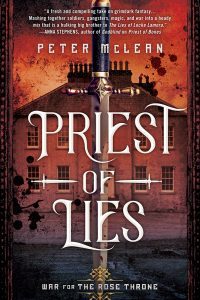 We return to Ellinburg following the first person perspective of gangster boss Thomas Piety, the head of the Pious Men. The way that McLean writes led me to feel like I was actually walking the streets of The Stink, enjoying a mug of beer in the Tanner’s Arms and that I was almost a member of the Pious Men myself. When a fantasy world has me that invested then it is difficult for an author to do much wrong. Since I read Priest of Bones I have read about 100 books so I always worry when returning to a fictional world after I’ve spent too much time away. Will I remember the characters? Political agendas? Warring factions? Etc… With Priest of Lies, I need not have worried. The reading experience at the beginning was like trying on a favourite hat that I thought I’d lost to find out that it still fitted perfectly and I still looked good in it! I fitted in with the world here again straight away and it was a great feeling.
We return to Ellinburg following the first person perspective of gangster boss Thomas Piety, the head of the Pious Men. The way that McLean writes led me to feel like I was actually walking the streets of The Stink, enjoying a mug of beer in the Tanner’s Arms and that I was almost a member of the Pious Men myself. When a fantasy world has me that invested then it is difficult for an author to do much wrong. Since I read Priest of Bones I have read about 100 books so I always worry when returning to a fictional world after I’ve spent too much time away. Will I remember the characters? Political agendas? Warring factions? Etc… With Priest of Lies, I need not have worried. The reading experience at the beginning was like trying on a favourite hat that I thought I’d lost to find out that it still fitted perfectly and I still looked good in it! I fitted in with the world here again straight away and it was a great feeling.
In addition to the quality worldbuilding, which is set across two cities this time, War for the Rose Throne’s greatest asset is the characters. They are a colourful bunch featuring many different characteristics and personalities, but they gel in sublime fashion under the guidance of Tomas, that they are a family. My favourites remain Tomas himself, his second Bloody Anne, and the young magician Billy the Boy – who is Tomas’ adopted son. Some of the ensemble who were featured heavily in the first novel get less page time here but other players have real standout performances. Jochan, Tomas’ slightly deranged half brother really shines as does the role Cutter – the mysterious and perhaps even nefarious assassin – plays. A revelation regarding the latter literally made my jaw drop! To say it’s a group composed of war veterans and hard as nails mercenaries, I don’t think there is a single member of the crew that I didn’t like reading about.
Either I’ve become softer in my old age of McLean has really upped the Grimdark stakes here when compared to Priest of Bones! Deaths of likable characters. Yes. People being eaten alive by a bear? Of course. Betrayals, sedition, turpitude? Sure. And a scene featuring a grotesque ritual that showcases what happens if you betray the Pious Men from the inside. Peter McLean sees your hammer scene Anna Stephens and he raises you this!
Priest of Lies is written in a style that caused me to devour the entire novel within two days. The chapters are short and sharp each taking about ten minutes to read. Each chapter is focused, precise and keeps the plot moving and flowing expertly. Even though the narrative is quite short by fantasy standards with 368 pages the dramatis personae is overflowing with characters however none of them seemed two-dimensional filler. I even cared about more obscure individuals such as Tomas’ barber which reflects the way he truly cares for those that are under his protection. If you cross his people you cross Tomas and the consequences to that can be drastic and I don’t really fancy being buried alive.
Priest of Lies is pretty damn exceptional. The ending is stunning and I can’t wait to see what comes next. I need to see Kurt’s sword again! Both the books in this series are 9/10 standard. This is the third book I have read by McLean and I have never been disappointed at all. The only negative I have here, and it’s very minor, is that Tomas says ‘as I have written’ far too many times and it niggled me a bit. Priest of Lies is stunning low fantasy by an author who is on top of his game. Start this series if you haven’t already.
Pre-order Priest of Lies
The post REVIEW: Priest of Lies by Peter McLean appeared first on Grimdark Magazine.
April 29, 2019
Review: God of Broken Things by Cameron Johnston
Ah, it is refreshing to read a fun gritty story. Sword-swinging action, virulent and explosive magic, and a host of quirky and entertaining characters, Cameron Johnston amps the grimdark to eleven with his exciting next installment in his Age of Tyranny series, God of Broken Things.
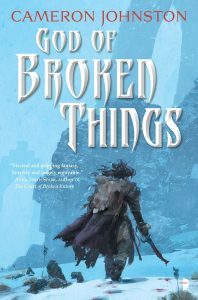 The plot revolves around the protagonist Edrin Walker, a magus that had slain the monster sent by the villainous Skallgrim, but not before it destroyed Setharis, and infected their magical elite with mind-controlling parasites. There’s almost little time to react though as the Skallgrim army marches on the mountain passes of the Clanhold, and Edrin, and his ragtag band of scumbags, must race to stop them.
The plot revolves around the protagonist Edrin Walker, a magus that had slain the monster sent by the villainous Skallgrim, but not before it destroyed Setharis, and infected their magical elite with mind-controlling parasites. There’s almost little time to react though as the Skallgrim army marches on the mountain passes of the Clanhold, and Edrin, and his ragtag band of scumbags, must race to stop them.
Johnston depicts a beautiful and lavish world that is a feast for the imagination. I was chilled as the gang traversed the mountainous passes of Clanhold. My mouth was left agape as I lay witness to the destruction of the once towering spires of Setharis. There is magic in Johnston’s world, and not the magus kind of magic! It is literary magic that only supreme fantasists can conjure within their regal tomes of fancy and I was humbled to be allowed into Johnston’s realm, even momentarily.
Johnston’s way with words is another thing that I must mention. The base description within the generic grimdark story revolves around “action, blood, sex, magic, monsters, more action, blood, and more sex”. At times there is little to no nuisance, and this is where Johnston excels above his luminaries. To read passages such as: ‘The Scarrabus shrieked in rage…as their god-beast fell to earth, burning and unconscious, its vast mind a fragmented thing drained of all magic…they slammed through the skin of the world and its fiery blood spewed into the sky’ and ‘flesh burst in a welter of blood and from his insides a god came forth…my guts churned and my Gift burned as if I stood too close to an inferno’, not only depict the world as gritty and dark, but as magical, volatile, and bleak. Broken Things is filled to the brim with such little details that build upon Johnston’s already wonderful world.
But that’s not to say that there’s no action or monsters, far from it. Though it takes a little while to start, once Broken Things hits its stride, it does not disappoint. There are strokes with steel, arcs of flames, and witty banter between characters as others are slain before their very eyes. I greedily consumed such segments like the gluttonous child I am, only wanting more and more as I turned the pages.
Whilst I thoroughly enjoyed Broken Things, there were some parts that detracted from Johnston’s novel. The language itself was a little derivative and while his description and worldbuilding was spot on, the characters’ vernacular and narration was, at times, tedious. This was disappointing and distracted me considerably as, more often than not, wonderful tidbits of detail was placed next to lines such as ‘Oh. Fucking. Shite. I suddenly needed to piss. Badly.’. The wittiness and banter does add a layer of levity much needed in Broken Things, but there were many instances where the levity took on a life of its own. The swearing did also border on being quite juvenile and not befitting such a fantasy realm, but that may in fact be a personal qualm of mine.
The characters were, unfortunately, mostly forgettable, though that might be the fault of being in the shoes of Edrin Walker. As a first-person novel, the reader is beholden to whatever the protagonist wants to see, feel, taste, and describe, and this in no exception in Broken Things. Walker is such a lively character, his descriptions and affable nature lure the reader into wanting to follow him and only him. This might not be so bad if it was a novel centred around a solo protagonist. It becomes an issue when the novel also features a ragtag coterie of bastards bound to the protagonist and the reader can hardly remember anything memorable about them.
Overall, Cameron Johnston’s God of Broken Things is a boon to those smitten with the grimdark genre. His words and world are but mana to those in need of some gritty and lively action. The pacing works and the story remains strong, even though it does have some issues. They, however dissipate as the reader loses themselves within the pages of the novel. A wonderful addition to the Age of Tyranny series and a definite recommendation.
Buy a copy
The post Review: God of Broken Things by Cameron Johnston appeared first on Grimdark Magazine.
April 27, 2019
REVIEW: Children of Time by Adrian Tchaikovsky
I received a review copy of Children of Time in exchange for an honest review. Thank you to Adrian Tchaikovsky and Pan Macmillan for the opportunity.
Children of Time is 600-pages of extraordinary, evolution-based science fiction that features quality storytelling and worldbuilding that is rarely seen in this generation. This narrative is set over 1000’s of years. We first see Doctor Kern and her scientific team of 19 as they wish to experiment with monkeys and a nanovirus on what some individuals are considering could be the new Earth. After betrayal and confrontation on their spaceship, which may be reflecting hostilities back on Earth events don’t progress in the way that they envisaged.
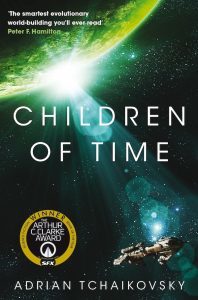 The action mainly follows two very different perspectives. The first is the views of a human classicist named Holsten who has travelled for two millennia to the above-mentioned planet after the end of Earth. He is onboard the spaceship Gilgamesh with the remnants of the human race and spends most of his years frozen and therefore not aging. The crew members are only awakened when their duties permit it necessary so our first contact with the human ensemble is when they are approaching the said planet. The crew features the needed components to create a new future including commanders, engineers, soldiers, intellects, etc… It transpires that the planet they are looking to land on is already occupied and it isn’t by the highly evolved monkeys as was planned. This brings me to the second perspective which is written from the point of view of spiders – a species that are also receptive to the advancements in evolution that the nanovirus presents. This complication was not accounted for and may be prblematic. We follow the spiders as they evolve over 100’s of generations and the way it is written is truly unique. The main spiders we follow are Portia, Bianca, and Fabian. They don’t live to be 1000’s of years old, instead, we follow the original characters’ relatives through different generations as the spiders evolve. They may share the same name but often have very different personalities. There is also a third perspective that is from a human/machine/satellite/messenger/God viewpoint and she is very protective of ‘her planet’ and does not wish for the humans to land. It’s a superbly original tale in the way it is presented.
The action mainly follows two very different perspectives. The first is the views of a human classicist named Holsten who has travelled for two millennia to the above-mentioned planet after the end of Earth. He is onboard the spaceship Gilgamesh with the remnants of the human race and spends most of his years frozen and therefore not aging. The crew members are only awakened when their duties permit it necessary so our first contact with the human ensemble is when they are approaching the said planet. The crew features the needed components to create a new future including commanders, engineers, soldiers, intellects, etc… It transpires that the planet they are looking to land on is already occupied and it isn’t by the highly evolved monkeys as was planned. This brings me to the second perspective which is written from the point of view of spiders – a species that are also receptive to the advancements in evolution that the nanovirus presents. This complication was not accounted for and may be prblematic. We follow the spiders as they evolve over 100’s of generations and the way it is written is truly unique. The main spiders we follow are Portia, Bianca, and Fabian. They don’t live to be 1000’s of years old, instead, we follow the original characters’ relatives through different generations as the spiders evolve. They may share the same name but often have very different personalities. There is also a third perspective that is from a human/machine/satellite/messenger/God viewpoint and she is very protective of ‘her planet’ and does not wish for the humans to land. It’s a superbly original tale in the way it is presented.
Often, science fiction stories that I read are overly complex with tech-lingo and it sometimes feels like the author is trying to prove how smart he is. In the first few pages of Children of Time, I thought it would be the same again. However, after the first chapter or two, it became crystal clear that this is a novel where the story, characters, and development are the top priority. It is beautifully written, and has been extremely well researched and is expertly paced. Children of Time is packed full of highs and lows. Who could have known I’d care about the death of a revolutionary hero giant-spider? The spiders’ society throughout various stages of evolution is intensely detailed and complex, still the way the species progress feels organic and natural although before this narrative I’d have never considered how a spider community would behave. Turns out they’re pretty damn sexist!
For quite a lengthy book I was reading this at a blistering pace. Chapters tend to be between 10-20 pages so it was always tempting to just read one more which soon became another 100 pages. Especially the last 100 pages with I devoured in one breathless sitting. It features an insane space battle and I could never have imagined reading something of the sort when I first picked this up. The ending is intense, unpredictable, but highly satisfying. When I finished reading this story the first thought I had upon reflection was that there is no way I could be an author because I could never write anything this good so what would be the point? It’s one of the best science fiction books I’ve ever read and I’ve already started Children of Ruin. A+ Recommended.
Buy yourself a copy
The post REVIEW: Children of Time by Adrian Tchaikovsky appeared first on Grimdark Magazine.
April 25, 2019
ANNOUNCEMENT: Winners of the Mark Lawrence Holy Sister giveaway competition
Five of you lucky devils will be taking home a UK hardcover of Mark Lawrence’s Holy Sister thanks to Harper Voyager UK! I’m very jealous of all of you.
Winner Winner chicken dinner
And the winners are… drumroll…
How to claim your prize
I’ll be emailing you to get your address details. Keep an eye out for an email from adrian (at) grimdark magazine (dot) com.
The post ANNOUNCEMENT: Winners of the Mark Lawrence Holy Sister giveaway competition appeared first on Grimdark Magazine.
April 21, 2019
REVIEW: Corax Lord of Shadows by Guy Haley
Corax Lord of Shadows is another entry in the sprawling, action-packed military sci-fi universe of Warhammer 30,000 brought to us by Black Library. With a focus on actual freedom versus the illusion of freedom within the iron fist of the unstoppable Imperial crusade, Corax Lord of Shadows was an exciting and fun entry point into the 30K universe.
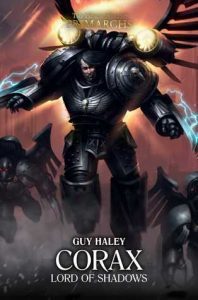 Corax, the primarch of the Ravenguard finds himself tasked by the Emperor to humble the thousand cities of the Carinae, and bring them under The Imperium’s yoke. A rebel group arises who think themselves to be enacting Corax’s vengeance for him. What they fail to understand is that while Corax wants for vengeance he is driven to establish order and the promised peace that will come when humanity rules the galaxy. By any means necessary.
Corax, the primarch of the Ravenguard finds himself tasked by the Emperor to humble the thousand cities of the Carinae, and bring them under The Imperium’s yoke. A rebel group arises who think themselves to be enacting Corax’s vengeance for him. What they fail to understand is that while Corax wants for vengeance he is driven to establish order and the promised peace that will come when humanity rules the galaxy. By any means necessary.
The key idea of this book is, “Freedom vs the illusion of, or more precisely planetary freedom vs the illusion of it within an empire” The Imperium offers a choice of any colour you’d like to draw with, so long as you draw within the clear, bold, immovable lines. Fans of Warhammer 30K and 40K will know this like the back of their hands—this has been the theme of this universe for decades. For new readers like myself this represents an important part of the Imperium of Man.
To the lords of Carinae freedom is to always have a choice. Being able to govern themselves as they had done in the past. Corax, his Legion and a vast Imperial war host arrive with a choice backed by a crusade.
I loved seeing Corax and the Ravenguard enact the will of the Emperor. The primarch weighing scales of vengeance alongside a will to see order and peace brought to all. I enjoyed seeing Corax’s own legionnaires question him. I saw them become shell-shocked and introspective of the foul things they had done and would do in a bid to achieve a golden-age for Mankind. The constant clamour of dissent in the voices of the people of Carinae, and the unbreakable will of The Lords, provided an excellent opposing force.
Guy Haley shows us how primarchs are different to the legionnaires. They think on a grander scale, and are demi-gods within the setting. They are razor sharp and perceptive. Above the abilities of the primarchs, the Emperor and his ambitions are well defined and obscure, even to Corax himself.
The side characters and their stories in the book are for me what shines. Corax is an interesting character. Although his thinking is human for a being so far removed, he is still far removed from us that at times I couldn’t connect with his character. I’d love to read some stories before he became about his earlier years before he became so subject to the dogma of the Empire, and see how different he may have been as a leader of his Homeworld before he was set to the task.
Corax Lord of Shadows is worthy of high praise. As an entry point into the Black Library it left me with a lot more unanswered questions. A few small flaws aside, the book is exceptional. The horrors of war in the vast expanse of the void are not glorified in the least bit. Characters remark on the violence and ponder why they do it and to what end. The plot has some good twists and does enough to not leave a clear answer on who is right or wrong.
I would not hesitate to recommend this book, both for old and new fans of 40K and 30K, alongside fans of military sci-fi and fantasy. The galaxy the Emperor envisions lives in black and white. As a reader I love seeing the grey areas and knowing that in all chaos there is order.
Potent, political and provocative. Corax Lord of Shadows is a fantastically introspective spectacle, watching Corax walk a razor’s edge with vengeance to the left and order on the right is incredibly entertaining.
Order a copy
The post REVIEW: Corax Lord of Shadows by Guy Haley appeared first on Grimdark Magazine.
April 19, 2019
REVIEW: We Lie with Death by Devin Madson
We Lie with Death follows four characters. Princess Miko, an empress with no empire who must protect her people, and survive the many trials that follow. Rah e’Torin finds himself with no ties to the new emperor, or the Second Swords. Torn between his old ways, and attempting to protect his people while weighing the scales, can he keep his honour when tradition is a blade that cuts both ways? Dishiva e’Jaroven finds herself tied to Gideon, a new Levanti emperor. Gideon has sights on making a new land for this people to thrive in once more., even if he must forge dangerous ties to Leo and askew Levanti ways. Sold to the witchdoctor to ends that only he may know, Cassandras fate becomes tied to Empress Hana.
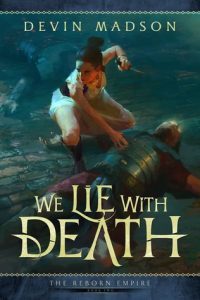 The world building takes on a grander scale than with new areas and characters brought into the fray. We learn a lot more of the world and its inhabitants, artfully shown in character or through exposition. In doing so Madson maintains an ability to paint a cinema-esque image of each scene. The emotional ties of fear, despair, love, joy, anger are wonderful. For a book to make the reader emotional is a rare magic that builds such a love for the world at large.
The world building takes on a grander scale than with new areas and characters brought into the fray. We learn a lot more of the world and its inhabitants, artfully shown in character or through exposition. In doing so Madson maintains an ability to paint a cinema-esque image of each scene. The emotional ties of fear, despair, love, joy, anger are wonderful. For a book to make the reader emotional is a rare magic that builds such a love for the world at large.
The pacing is akin to We Ride the Storm, rumbling slow thunder pairs with sharp bloodshed and turmoil. When the rain comes in Kisia it pours. The sequel contains a lot more intrigue from Miko and Dishiva. Fast paced action driven by Rah and Cassandra provides occasional shots of adrenaline that amp up the tension. Every character grows more in the sequel. I had a lot more time for Princess Miko this time around. I recall finding her character my least favourite in the first book (until the latter chapters). She becomes far more independent and begins to weather the storm with her head held high. Her phoenix-like rise from the ashes is excellent to observe. She embodies the fall down seven times get up eight proverb and I enjoyed reading her segments.
The prose in We Lie with Death also improves in comparison to the first. High praise given how much I loved We Ride the Storm. The plot weaves back and forth with revelations, rivalries, and revenge peppered throughout. I was a huge fan of every point of view. Devin has started to nail the magic of the baited hook, leaving me several times wrenching it out of my lip to go and eat or continue with other matters. Rest assured I sped through them and dove back into the world eager to consume more chapters, only to find myself chasing another well placed bait—even as I knew I was chasing the end, a bittersweet realisation.
Devin Madson is an author to watch and I am sure with time she will become a huge name within the industry. I can without hesitation recommend The Reborn Empire for fans of Eastern folklore and culture with a superb story that is human and relatable and balances yin and yang on the scales with the ease of a practiced merchant. Whilst the series thus far are a fantastic example of the Grimdark genre it also packs heart and hope which carries the reader through the dark, bloody, and conflicted world into a rain-soaked sun-bathed clearing to bask in the beauty of it all.
Note regarding the release of We Lie with Death
Unfortunately, there has been a delay in release as shown on the Author’s Facebook page. We at GdM are looking forward to the release date and wish Devin all the best!
The post REVIEW: We Lie with Death by Devin Madson appeared first on Grimdark Magazine.
REVIEW: Berserk by Kentaro Miura
When asked to recommend fantasy texts (especially of the grimdark variety), there is always one franchise that comes to mind, and that is Kentaro Miura’s manga series, Berserk. Set in a medieval-styled fantasy world, the story centres around the protagonist, Guts, a hulking mercenary, and his adversary (once-friend), Griffith, the charismatic leader of the mercenary band, Band of the Hawk.
Since its inception in 1988, Berserk has remained as the pinnacle of the ideal grimdark text as it not only illustrates a tale of vengeance and the eternal struggle between man and destiny, but examines themes of friendship, loneliness, good and evil, and the best and worst aspects of human nature. A darkness permeates Miura’s world with a miasmic shroud of a blackened fog and malaise. There is an indecipherable will of alien gods, carnal demons, and the insatiable thirst of power and lust. Pain is etched upon a blank canvas with the scratching of black ink, and the calculating winds of causality and destiny dictate the fate of men and women in a world that has, and always will be, unwelcoming.
Miura advances the story in “arcs”, short serialised fragments that usually span three to five manga volumes. Each arc elegantly weaves this dark tale of Guts upon a blood-soaked tapestry, Miura sending him across the hostile Midland, having Guts battle the inhuman apostles and their cenobite-inspired monarchs, the God Hand. I appreciate this format, especially in manga form, as it allows Miura to explore and examine a diverse assortment of landscapes (dreamscapes as well) and characters, some even impacting Guts long-term. Some arcs are stronger than others (the second, The Golden Age arc is arguably the strongest), but it would be glib to avoid specific storylines. Each arc fleshes out Miura’s world and further fleshes out Guts from a baby born of a hanged woman to the lonesome warrior in search for meaning in a chaotic world.

While the story of Berserk is wonderful, it is nothing without Miura’s artistry. Miura combines such elements of Zdzisław Beksiński and M.C. Escher, the pen strokes, effective in depicting the pain of Guts as he wages war on his enemies. There is a raw savagery when Guts swings his absurdly huge sword, Dragon Slayer. Though the later volumes are drawn digitally, Miura never strays far from this savagery that has become so integral to his series, one might even call it, berserk!
There have been several attempts at adapting Berserk into an anime, but they are mostly middling. The earliest adapted in 1997 by OLM, Inc. is perhaps the most respectable to the manga as it retains Miura’s hand drawn panels. In depicting The Golden Age arc, the story itself remains intact and true to the manga, and to see Guts and Griffith’s developing friendship and respect, only for it to be tragically torn away at the end of the series remains effective and brutal. The quality of the animation hasn’t aged well, especially in relation to other anime of the late 90’s, but Miura’s story remains supreme, and that is what is most important after all.
The film series developed by Studio 4°C, Berserk: The Golden Age, like the 1997 series, adapts The Golden Age arc in three films: The Egg of the King, The Battle for Doldrey, and Advent. Again, like the first series, the story remains intact, but the CGI animation quality is mostly subpar. The story does remain king, but when the artistry is so integral to the text itself, the viewer comes away with a lesser experience than that of the manga reader. Advent does make up for this as it depicts the major conflict of the text superbly and shockingly ghastly, which does make up for the failures a little bit.
The 2016 Berserk series developed by GEMBA and Millepensee remains a blot on Miura’s legacy as it not only tangles the lore but decimates the beautiful artistry. It is an ugly adaption, the CGI quality far below anything that I have ever witnessed in my life. The sound effects are off, the voice acting is amiss, and even the choice to start at the Conviction arc is an odd choice. To spend more time on writing about this travesty would be pointless, but there is something hopeful about this series, and that is the music.
The one constant throughout 1997 to 2017 in Berserk is Susumu Hirasawa’s amazing score Not only is his voice wonderful, but the use of antiquated instruments in harmony with some eclectic and dark electronic melodies soothe the soul and lull the audience in some kind of ethereal dreamscape. His work is so influential, even Miura listens to his songs whilst penning his newer chapters, and if that’s not a solid recommendation, then I don’t know what is.
For those wanting to lose themselves into Berserk, I fully recommend reading the manga series first and foremost. Berserk truly shines on the page as Guts, Griffith, the apostles, and other motley assortment of characters truly live and breathe in manga form. It is brutal and at times, rough to read, but for those with darker tastes, there is nothing greater than relishing in Miura’s dark fantasy. With over thirty-nine volumes released, there is much to read! But do so slowly as the release date for chapters remains erratic.
Allow the strand of causality to reel you in and follow Guts on a journey to defy destiny and to remain human in an inhuman world.
The post REVIEW: Berserk by Kentaro Miura appeared first on Grimdark Magazine.
April 13, 2019
REVIEW: Shadows of the Short Days by Alexander Dan Vilhjálmsson
Vilhjálmsson’s debut is a masterfully crafted dark tale that fuses elements of alternative history, steampunk, science fiction, urban fantasy, and grimdark. It is a strikingly original and often complex narrative that mainly follows two well-crafted protagonists. Sæmundur is a sorcerer who has recently been expelled from the magic university of Svartiskóli for being too ambitious, being intrigued by gaining absolute knowledge of the esoteric source of magic galdur which is forbidden and borderline heresy. He has been nicknamed Sæmundur the Mad, is now a drug and alcohol-fuelled reprobate in the eyes of the majority of his peers but he wishes to prove them wrong. The other major player is Garún who is a talented graffiti artist and she wears headphones which contain a noisefiend. She is a half-breed known as a blendingur and she has a political agenda that she magically bleeds into her artwork often brainwashing people to the cause of a potential revolution.
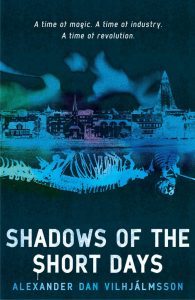 Shadows of the Short Days was a similar reading experience to the one that I enjoyed with The Gutter Prayer by Gareth Hanrahan. It takes certain fantasy tropes and turns them on their heads and breathes fresh air into the genre. This story is brimming with interesting original races, magic and monstrosities including the winged and intimidating Náskárar, the art of seiour, and a cloth-golem are examples respectively. The novel — which I believe is the first of a pair that Gollancz have commissioned — features parallel worlds, demons, jellyfish that aid breathing underwater, huge airships, rebellious factions, grotesque torture segments, mind-reading, complex incantations, and magical rituals, and a loveable pet cat amongst many other elements.
Shadows of the Short Days was a similar reading experience to the one that I enjoyed with The Gutter Prayer by Gareth Hanrahan. It takes certain fantasy tropes and turns them on their heads and breathes fresh air into the genre. This story is brimming with interesting original races, magic and monstrosities including the winged and intimidating Náskárar, the art of seiour, and a cloth-golem are examples respectively. The novel — which I believe is the first of a pair that Gollancz have commissioned — features parallel worlds, demons, jellyfish that aid breathing underwater, huge airships, rebellious factions, grotesque torture segments, mind-reading, complex incantations, and magical rituals, and a loveable pet cat amongst many other elements.
It is written in the third person following the two aforementioned main characters for the most part; however, there are a couple of chapters that are from a different perspective to add extra depth. Like many debut novels, to add weight and complexity to the characters we are treated to a few flashback scenes. These also aid in the narrative presenting the overall world, the folklore, racist views and undertones held by some, and past character relations. The supporting players were not as fully fleshed but were still interesting with their backstories and their own dilemmas. One minor criticism is that some of the characters names were confusing and I had to write notes to remember who was who. Names such as Styrhildur, Hraki, Hrolfur, Katrin, Kölski — I also occasionally forgot who was male and who was female, and when a character reappeared near the end of the story I had completely forgotten who he was so had to re-skim previous chapters to put it all into context. A good amount of the terminology here I believe is crafted specifically for this alternative worldview of Reykjavik. Fortunately, the novel includes a glossary of the more confusing/difficult words. I’m hoping that the final version will include a Dramatis Personae and a map of the city where most of the action takes place.
It was not an ‘unputdownable’ novel that I raced through in a few days but it was a book that every time I picked up I truly wanted to savour every word, event, development, and chapter. It’s superbly well written, thrilling, and the pacing is exquisite. The latter is often due to a mid-chapter point of view switch at certain times throughout to accentuate the pacing, emotion, and intensity when it was needed. The finale is complex, slightly confusing and features a major revelation. I did have to re-read it twice and I still didn’t fully understand it, especially the epilogue, but like Malazan, I think this is a story that will be much better when reading it for a second time, which I definitely will at some point. Shadows of the Short Days is 5-stars for originality, 4-stars overall, but I’m sure this could increase when I re-read this before the next book in the Hrímland saga is unleashed. Vilhjálmsson has presented us with one of the most ambitious, intense, original and thrilling debuts that I’ve read in a long time. If there was a Board of Book Classification I would give this one an 18+, some scenes out-dark some of the modern brutal grimdark and it’s not always enjoyable to read for that reason. Either way, this is highly recommened and should be a big deal in the fantasy scene. I’ve also researched that Vilhjálmsson is the vocalist of a black metal band which doesn’t surprise me following a few scenes that are featured here and the importance of sound and noise throughout. Now, if you will excuse me I am going to listen to some of his music.
I received an uncorrected proof copy of Shadows of the Short Days in exchange for an honest review. I would like to thank Alexander Dan Vilhjálmsson and Gollancz for the opportunity.
Pre-order a copy
The post REVIEW: Shadows of the Short Days by Alexander Dan Vilhjálmsson appeared first on Grimdark Magazine.
April 12, 2019
COMPETITION: Win a signed hardcover of HOLY SISTER by Mark Lawrence
The GdM team and I love Mark Lawrence’s books, so we’re really excited to be able to partner with HarperVoyager UK to give away five copies of Holy Sister, book three in the Book of the Ancestor trilogy!
GdM’s review of Holy Sister
The mysterious and most cantankerous reviewer on the GdM team, Malrubius had this to say about Holy Sister:
The series is truly a masterwork of speculative fiction writing the likes of which is rarely achieved. Lawrence is a frigging genius…it is most likely his greatest achievement as a speculative fiction writer. I can’t even imagine how he could write a book like this in a year. It just blows my tiny mind.
Read the full review here!
Eligibility
If you’re on planet earth and you have a postal address, you’re in. Enter using as many of the entry options as you like to give yourself as many chances to win a copy of Holy Sister as possible!
Enter now!
Well? What’re you waiting for? Get in!
The post COMPETITION: Win a signed hardcover of HOLY SISTER by Mark Lawrence appeared first on Grimdark Magazine.



